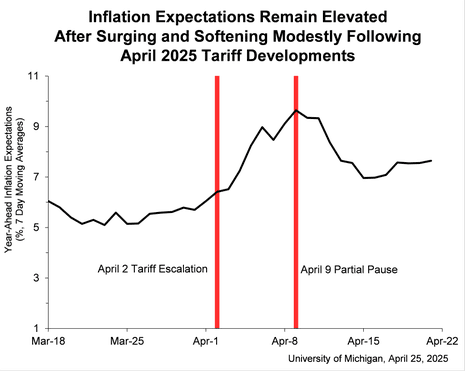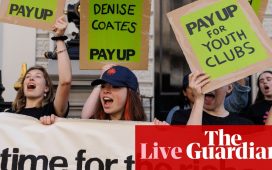US consumer expectations in steepest slide since 1990s recession
Ouch! US consumers’ economic expectations have slumped at the fastest rate since the 1990s recession.
A closely-watched poll of consumer morale, from the University of Michigan, has found that economic expectations have fallen by a “precipitous” 32% since January, which they say is the biggest three-month drop since the economic downturn 35 years ago.
The survy also found that consumer sentiment fell for the fourth straight month in April, plunging 8% from March, driven by a tumble in expectations.
The final April sentiment index fell to 52.2 from 57 in March. That’s the fourth-lowest reading in data back to the late 1970s, Bloomberg reports.
Sentiment is 32% lower than a year ago, the survey show.

Surveys of Consumers director Joanne Hsu says:
Expectations have fallen a precipitous 32% since January, the steepest three-month percentage decline seen since the 1990 recession
While this month’s deterioration was particularly strong for middle-income families, expectations worsened for vast swaths of the population across age, education, income, and political affiliation.
Consumers perceived risks to multiple aspects of the economy, in large part due to ongoing uncertainty around trade policy and the potential for a resurgence of inflation looming ahead. Labor market expectations remained bleak. Even more concerning for the path of the economy, consumers anticipated weaker income growth for themselves in the year ahead.
Without reliably strong incomes, spending is unlikely to remain strong amid the numerous warnings signs perceived by consumers.
The poll also found that Americans’ year-ahead inflation expectations surged from 5.0% last month to 6.5% this month, the highest reading since 1981.
The University of Michigan also provided a handy chart, showing how inflation expectations evolved with major trade policy announcements this month.

They say:
After the April 9 partial pause in tariff increases, inflation expectations ebbed but remained substantially elevated relative to March.
The final April numbers are out today from the Univ. of Michigan consumer sentiment index. Here are the month-over-month changes by party.
Republicans +2.8
Democrats -6.9
Independents -9.5 pic.twitter.com/vtvNdZ5ceR— John Horvick (@horvick) April 25, 2025
Key events
Closing post
With the London stock market closed, it’s time to wrap up for the day, and the week!
A brisk recap:
US consumer sentiment has fallen to one of the lowest readings on record, as Americans fear that Donald Trump’s trade war will drive up prices and slow the economy.
China has denied it is in talks with the US about a trade deal… after Donald Trump claimed the two sides were negotiating.
But there are also signals that Beijing is lifting some tariffs, to de-escalate the situation.
Top policymakers in Beijing also pledged to support firms and workers most affected by the impact of new US tariffs.
In London, the FTSE 100 index has posted its longest winning streak in over five years.
Our US Politics blog will be tracking the action:
Here’s our economics editor Heather Stewart’s take on this week’s Spring Meeting of the IMF in Washington.
And here’s a flavour:
Kristalina Georgieva’s favourite film, the International Monetary Fund boss told the audience at a packed panel event in Washington on Thursday, is Tom Hanks’s cold war romp Bridge of Spies.
In one of the stranger digressions in a frequently strange week, Georgieva recalled the moment when Hanks’s character, a US lawyer, tells the Soviet spy he has been appointed to defend that he will probably be executed. “You don’t seem alarmed,” Hanks says to him; to which the spy – played by Mark Rylance – replies, “Would it help?”
Georgieva mentioned the vignette to underline the fact that this week’s spring meetings of the IMF and World Bank were not swept up in panic, despite the mayhem emanating from the Trump administration.
FTSE 100 posts 10-day winning run for first time since 2019
Britain’s stock market has just posted its longest run of daily gains in over five years.
The FTSE 100 index of blue-chip shares has closed almost 8 points higher tonight at 8415 points, a rise of 0.09%.
That means it has now risen for 10 sessions in a row, having climbed from 7679 points on 9 April. That’s the longest winning run since 2019, when Boris Johnson’s election win sparked a relief rally.
Neil Wilson, UK investor strategist at Saxo Markets, says the UK market has benefitted from a broad relief rally, but there’s more to it than that…
Wilson writes:
The news flow on tariffs has been incrementally more positive, while the Fed has hinted at being ready to cut rates in the coming months.
But it’s also the case that the FTSE has a lot of defensive characteristics – we’ve noted earlier that there are plenty of stocks with hefty dividend yields that can be viewed as a place of relative shelter from instability and volatile markets. It should be noted that when markets are stressed, capital preservation becomes even more important and some big dividend payers could be attractive.
The relative shelter from volatility is highlighted by the fact that in the period since April 9th, while the FTSE has made slow and steady progress, the S&P 500 has seen one daily decline of almost 3.5%, and two more in excess of 2%. The FTSE 100 may be like an old blanket that you can wrap yourself in when times are tough and the shiny stuff breaks.
It may also be that the UK is benefiting from a broad reallocation of global capital from the US to elsewhere. It’s noteworthy that in the same two-week period from April 9th closing low, sterling has gained about 4.5% against the dollar. In dollar terms the FTSE is up about 15% since the lows after recovered its pre-liberation day equilibrium.
BoE’s Greene says Trump tariffs probably deflationary for UK
Back in Washington, Bank of England policymaker Megan Greene has predicted that Donald Trump’s tariffs are likely to lead to lower rather than higher inflation in the UK.
Greene told a discussion with the Atlantic Council think tank on the sidelines of the International Monetary Fund’s spring meeting that:
“We have tariffs, and none of us have any idea what they’ll look like when the dust finally settles,”
“In my mind, the risk space has changed a little bit. So I think the risk is now on the disinflationary side. So I think that tariffs on the UK would, on net, be more disinflationary than they are inflationary.”
Greene, one of the hawkish members of the Bank’s monetary policy committee, also said she was concerned about weak growth.
Factcheck: Tariffs could be deflationary in two ways. First, a global trade war could dampen economic growth, leading to weaker demand. Second, companies hit by US tariffs could ship more goods to other countries, such as the UK, and cut prices to be competitive.
On the other hand, if the UK retaliated with its own tariffs, then that would push price up.
US consumer expectations in steepest slide since 1990s recession
Ouch! US consumers’ economic expectations have slumped at the fastest rate since the 1990s recession.
A closely-watched poll of consumer morale, from the University of Michigan, has found that economic expectations have fallen by a “precipitous” 32% since January, which they say is the biggest three-month drop since the economic downturn 35 years ago.
The survy also found that consumer sentiment fell for the fourth straight month in April, plunging 8% from March, driven by a tumble in expectations.
The final April sentiment index fell to 52.2 from 57 in March. That’s the fourth-lowest reading in data back to the late 1970s, Bloomberg reports.
Sentiment is 32% lower than a year ago, the survey show.

Surveys of Consumers director Joanne Hsu says:
Expectations have fallen a precipitous 32% since January, the steepest three-month percentage decline seen since the 1990 recession
While this month’s deterioration was particularly strong for middle-income families, expectations worsened for vast swaths of the population across age, education, income, and political affiliation.
Consumers perceived risks to multiple aspects of the economy, in large part due to ongoing uncertainty around trade policy and the potential for a resurgence of inflation looming ahead. Labor market expectations remained bleak. Even more concerning for the path of the economy, consumers anticipated weaker income growth for themselves in the year ahead.
Without reliably strong incomes, spending is unlikely to remain strong amid the numerous warnings signs perceived by consumers.
The poll also found that Americans’ year-ahead inflation expectations surged from 5.0% last month to 6.5% this month, the highest reading since 1981.
The University of Michigan also provided a handy chart, showing how inflation expectations evolved with major trade policy announcements this month.
They say:
After the April 9 partial pause in tariff increases, inflation expectations ebbed but remained substantially elevated relative to March.
The final April numbers are out today from the Univ. of Michigan consumer sentiment index. Here are the month-over-month changes by party.
Republicans +2.8
Democrats -6.9
Independents -9.5 pic.twitter.com/vtvNdZ5ceR— John Horvick (@horvick) April 25, 2025
Wall Street opens cautiously as China denies US talks underway
There’s a mixed start to trading on Wall Street today, as investors try to work out what’ happening in the trade war.
The Dow Jones industrial average, of 30 large US companies, has dipped by 22 points or 0.05% to 40,070 points.
The broader S&P 500 index is up 0.2%, though.
Traders could take some comfort from signs earlier today that China is looking to de-escalate the situation, by removing some tariffs.
However, they may be concerned that China has denied that it is in talks with the US about tariffs.
A foreign ministry statement posted by the Chinese Embassy in the US says:
“China and the US are not having any consultation or negotiation on tariffs. The US should stop creating confusion.”
That rather undermines Donald Trump’s claim to Time Magazine that his administration is in active talks with the Chinese to strike a deal.
M&S pauses online orders after cyber attack
Oooh! Back in the London stock markets, shares in Marks & Spencer have dropped by 4% after it announced it is pausing taking online orders in the UK and Ireland due to a recent ‘cyber incident’.
M&S told the City:
As part of our proactive management of the incident, we have made the decision to pause taking orders via our UK & Ireland websites and apps and some M&S International operated websites. The M&S product range is available to browse online, and our stores remain open and ready to welcome and serve customers.
We continue to manage the incident proactively and the M&S team – supported by leading experts – is working extremely hard to restore online operations and continue to serve customers well.
Earlier this week, M&S apologised to customers after a “cyber incident” affected contactless payments and the pick up of online orders in it stores in recent days.
M&s says today that there is still no need for customers to take any action, which may indicate that personal data has not been accessed.
Bank of England to test if central counterparties can handle a trade war
The Bank of England is going to test how the City’s crucial financial plumbing would cope with a serious trade war.
The Bank revealed today that this year’s test of central counterparties will involve a scenario involving a market panic about a trade war and a sovereign debt crisis.
Central Counterparties (CCPs) act as an intermediary between buyers and sellers in financial transactions, and are the counterparty to both sides of the trade. The Bank will kick the tires on three – all three UK authorised CCPs – ICE Clear Europe Limited (ICEU), LCH Limited (LCH), and LME Clear Limited (LMEC).
The Bank says:
The Stress Test will be centred on a bespoke ‘Baseline Market Stress Scenario’, designed by the Bank. This scenario is an extreme but plausible hypothetical scenario, equivalent to a one in 3,500 event, in terms of where the scenario sits relative to the historic distribution.
It is intended to represent extreme market moves over a period of two to five days in which there is escalating concern about fragmentation in global trade and sovereign debt risks. This results in a sharp decline in equity markets, rising interest rate expectations and mixed movements in commodities markets.
The 2025 CCP Stress Test will use a reference date of end of day Wednesday 26 March – a week before Donald Trump’s “Liberation Day” tariff announcement, that led to turmoil in the markets….
Soybean prices have hit their highest level in two and a half months, helped by hopes of a de-escalation in the US-China trade war.
The most-active soybean contract on the Chicago Board of Trade hit its highest since February 5 at $10.67-1/2 per bushel.
Reuters has more details about what’s occuring in the soybean world:
U.S. soybeans have not been mentioned so far in Chinese tariff exemptions and China is currently in a period where it mainly buys freshly-harvested Brazilian soybeans.
However, moves to defuse trade tensions are seen as positive for U.S. exports beyond this season.
Sentiment in the U.S. soybean market has also been boosted by brisk demand from Europe and a report that Japan is considering an increase in soybean imports from the United States as part of tariff negotiations.
Trump: I didn’t get the yips over market mayhem
Just in: Donald Trump has denied that panic in the bond market forced him to temporarily lift his reciprocal tariffs for 90 days.
He’s given a big interview to Time Magazine, to mark 100 days of the second Trump presidency, in which he insists that tariffs are necessary.
Speaking about the 90-day pause to the ‘Liberation Day’ tariffs, Trump says:
“The bond market was getting the yips, but I wasn’t.”
Trump added that he would consider it a “total victory” if the U.S. still has tariffs as high as 50% on foreign imports a year from now.
[Reminder, Trump announced the 90-day pause on 9 April, a week after announcing a swathe of new tariffs, following wild turbulence in the bond and stock markets]
Trump also told Time that China’s President Xi Jinping has called him, and that his Administration is in active talks with the Chinese to strike a deal.
He adds:
“There’s a number at which they will feel comfortable. But you can’t let them make a trillion dollars on us.”
❗️Highlights of Donald Trump’s interview with TIME magazine
🔴 ”I think what caused the war to start was when they [Ukraine] started talking about joining NATO”
🔴 Crimea will stay with Russia” and Zelensky understands this
🔴 ”I do not think Ukraine will ever join NATO”
— Ignorance, the root and stem of all evil (@ivan_8848) April 25, 2025
Russia’s central bank warns of tariff impact on inflation, after holding rates at 21%
Russia’s central bank has warned that trade conflict could push up domestic inflation, as it voted to leave interest rates on hold.
The Bank of Russia fears that the rouble could weaken if oil price fall, or the global economy slows, which would make inports more expensive.
After voting to leave interest rates on hold at 21%, the Bank said that the balance of inflation risks is still tilted to the upside in the medium term.
It explained:
The key proinflationary risks are associated with a longer upward deviation of the Russian economy from a balanced growth path and high inflation expectations, as well as with the deterioration in the terms of external trade.
A further decrease in the growth rate of the global economy and oil prices in case of escalating trade tensions may have proinflationary effects through the ruble exchange rate dynamics.
This chart from Cornwall Insight shows how its forecast for the price cap change in July has dropped in recent weeks, as wholesale energy prices have weakened.
Dr Craig Lowrey , Principal Consultant at Cornwall Insight, strikes a cautious note, though:
“While a fall in bills will always be welcomed by households, we mustn’t get ahead of ourselves. We have all seen markets go up as fast as they go down, and the very fact the market dropped so quickly shows how vulnerable it to geopolitical and market shifts.
“It would be easy to conclude the fall in the market was due to the United States tariffs, but the reality is that the interactions within and across the energy market are complex – from energy storage requirements in Europe, to warmer weather, to global trade issues – and contribute to the volatility we have seen in recent weeks.
“There is unfortunately no guarantee that any fall in prices will be sustained, and there is always the risk of the market rebounding. The only real way to protect households from this constant cycle of instability and insecurity is to reduce our dependence on international wholesale markets. That means continuing to focus on growing low carbon energy generation here in Great Britain and building a more secure, more sustainable energy future.”
British energy price cap tipped to fall in July
Energy bills across Great Britian are set to fall this summer, partly thanks to the disruption caused by Donald Trump’s trade war.
Consultancy Cornwall Insight has predicted that the quarterly price cap set by regulator Ofgem will fall by almost 9% in July, due to a recent fall in wholesale energy prices.
That would cut an average bill by £166 per year, bringing a typical household bill down to £1,683 from July, from £1,849 in April.
Cornwall Insight explain:
The recent decline in wholesale prices has been driven by a mix of geopolitical and market developments, including the United States’ decision to introduce tariffs – and the broader impact of these – and the impact of above average temperatures, which has reduced demand expectations and eased pressure on short-term prices.
While falling prices may appear to be good news, they are also a sign of how volatile the market remains. There are many moving parts, and with the July cap still a month away from being finalised, it is too early to say whether these reductions will hold.
The trick in the markets in recent weeks has been to “sell hubris, buy humiliation”, say analysts at Bank of America.
They told clients this morning there has been a remarkable flip from “US exceptionalism” hubris to “US repudiation”, with 304 stocks in the S&P 500, and 58 in Nasdaq 100 now trading below their 2021-22 highs.
They also point out that while many US stocks are now oversold, Spanish stocks are up 25% year to date in US dollar terms.
That shows tht a “reallocation of global capital from US” has begun, “e.g. Latin American capital now heading to Madrid not Miami”.
UK exported £59.3bn of goods to US last year

Richard Partington
The US was becoming an increasingly important export market for the UK before Donald Trump’s tariffs, according to official figures.
Highlighting the stakes in the escalating trade war, the latest snapshot for 2024 from the Office for National Statistics shows the UK exported £59.3bn of goods to the US market last year.
Accounting for 16.2% of all of the UK’s goods exports worldwide, the ONS said the US had been growing in importance for British companies as a market to sell cars, pharmaceuticals and other manufactured goods.
This is because the proportion of total goods exported to the US has been steadily rising in recent years, up from 13.8% of global exports in 2022. The ONS says this is “indicating that the US may be becoming a relatively more important export partner for the UK.”
Machinery and transport equipment is the main export to the US, with shipments worth £29.1bn in 2024 – a £1.8bn (6.7%) increase on the previous year. This was followed by chemicals, worth £10.8bn – accounting for almost a fifth of the UK’s global chemicals exports.
Allow content provided by a third party?
This article includes content hosted on ons.gov.uk. We ask for your permission before anything is loaded, as the provider may be using cookies and other technologies. To view this content, click ‘Allow and continue’.
The data also show that the UK ran a small trade in goods surplus with the US, as it imported £57.1bn of goods from the United States last year.
The details come as the chancellor, Rachel Reeves, is in Washington for the spring meetings of the International Monetary Fund and the World Bank, where she is also aiming to make progress towards a trade deal with US officials to exempt Britain from Trump’s blanket 10% tariff on imports.
Cars – subject to 25% US tariffs – were the biggest single category of export, worth £9bn – accounting for 27.4% of all global car exports. This made the US the UK’s number one export partner for cars, with sales worth more than double the second-largest market – China.
Exports of iron and steel – also subject to 25% US tariffs – were worth a relatively limited £400m, accounting for 8.4% of total global exports.
The UK’s trade in services with the US was worth significantly more than the value of goods. In 2024, the UK imported £61.2bn of services and sold £137bn of services exports to the US – led by areas including research and development, professional and management consulting.
American Chamber of Commerce in China president Michael Hart said companies in the pharmaceutical sector had reported that they had been able to import drugs to China in the past week with tariff exemptions, Reuters reports.
He said he believed that the exemptions granted by China were drug-specific, not industry wide in nature.
China’s Politburo pledges to support firms and workers hit by US tariffs
Back in China, top policymakers have pledged to support firms and workers most affected by the impact of new US tariffs.
The ruling Communist Party’s Politburo held a top-level meeting today, and state media report that officials also reiterated plans to accelerate debt issuance and ease monetary policy.
The state media Xinhua reports that president Xi Jinping presided over the meeting.
Xinhua says:
It was noted at the meeting that the country has seen its economy improve this year, with public confidence continuously boosted and solid progress made in high-quality development.
However, the foundation for the country’s sustained economic recovery needs to be further consolidated, and the country faces increasing impact from external shocks, the meeting said.
The meeting urged preparing for worst-case scenarios with sufficient planning, and taking concrete steps to do a good job in economic work.
FTSE 100 on track for best winning streak since 2019
The UK stock market is on track to extend its longest winning run since the aftermath of Boris Johnson’s election victory over five years ago.
The FTSE 100 has already risen for the last nine trading sessions, as trade war tensions have cooled, which is the best run since December 2019. A 10th rise today would match the “Boris Bounce” rally.
Before that, I think you’ve got to look back to December 2016/January 2017, when the FTSE 100 posted a 14-day rally.







